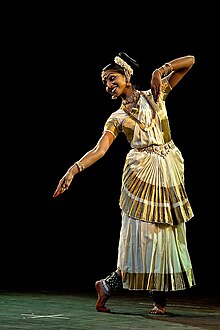Mohiniyattam
Mohiniyattam or Mohiniattam is a classical Indian dance style from the southern Indian state of Kerala . The dance refers to the legend of the divine seductress Mohini .
Originally this dance was only performed by women of the Nayar caste.
The Mohiniyattam is a solo dance danced by women, which resembles the Kathakali in its dance form . However, this dance is more popular, the performances are shorter and the Malayalam language is used. In addition, the costumes are less ornate, the dancer only wears a simple sari with a blouse and the make-up is also reduced. In terms of gestures , facial expressions and dance movements, however, there is an extensive correspondence with the Kathakali, although the Mohiniyattam is less stylized and systematized.
Mohiniyattam comes from the traditions of the temple dancers, who also performed in Kerala from the 9th century. However, the Mohiniyattam is more a court dance than dances performed in temples. Due to the loss of power of the princes and kings, this dance style was almost forgotten, one of the few who still taught this dance was the dance master Vallatol Menon in Kerala, who helped it to a renaissance.
One of the world's leading Mohiniyattam dancers is currently Dr. Deepti Omchery Bhalla, who was awarded the Sangeet Natak Akademi Award in 2007 by the Indian National Academy of Music, Dance & Drama .
literature
- Fabrizia Baldissera, Axel Michaels : The Indian dance. Body language in perfection. DuMont Buchverlag, Cologne 1988.
- Kalamandalam Radhika: Mohiniattam. The lyrical dance of Kerala . Mathurbhumi Books, Kozhikode 2004.
- Kanak Rele: Mohini Attam. The lyrical dance . Nalanda Dance Research Center, Mumbai 1992.
- Bharati Shivaji: The art of Mohiniyattam . South Asia Books, New Delhi 1986.
